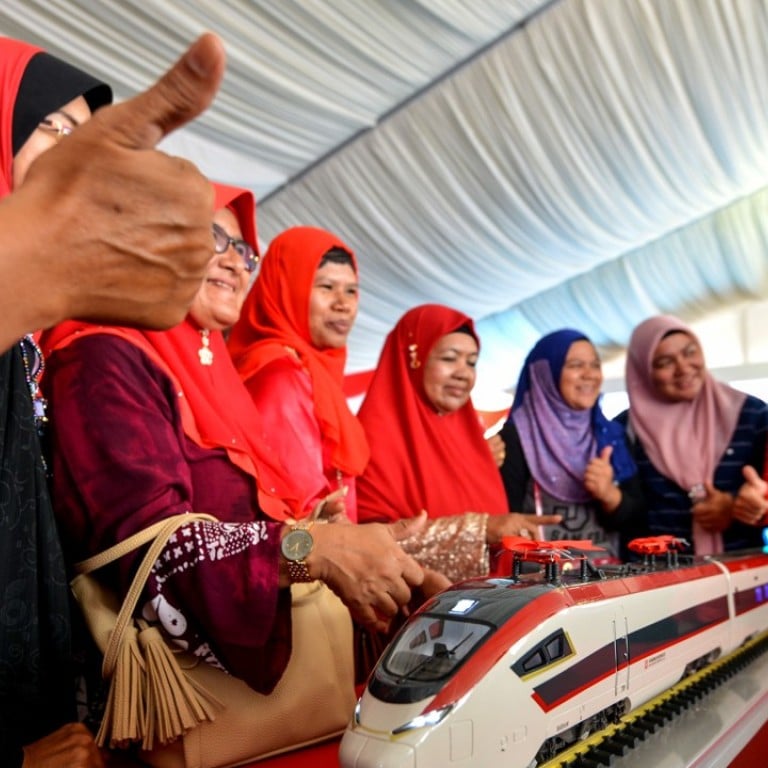
China’s biggest builders are sure that Xi Jinping can help them get Malaysia contracts back on track
China Communications Construction, the contractor of Malaysia’s largest public works project, said it is confident of getting the Chinese government’s support to get its cancelled contract back on track through President Xi Jinping’s negotiations with the administration of Malaysian premier Mahathir Mohamad.
“Since the project involves both nations’ economic and trading interests, we believe China and Malaysia will resolve the issue in a friendly manner,” the state-owned contractor’s overseas executive vice-president Li Qingwei said during a results press conference in Hong Kong. “We believe the Malaysian parties – companies and government – will negotiate, taking Malaysia’s economic development needs and its citizens’ livelihood improvement prospect into consideration.”
The US$15 billion East Coast Rail Link project (ECRL) was supposed to connect Peninsular Malaysia’s rural east coast to Port Klang in Selangor state on the coast of the Strait of Malacca through 688 kilometres of high-speed railway.
Nine months after breaking ground, the project – the most expensive infrastructure project ever undertaken in Malaysia – was stillborn when Mahathir won a landslide election and ousted the ECRL’s strongest proponent, Najib Razak, from government. Balking at the construction cost, Mahathir shelved the ECRL, two oil pipelines in Sabah state and a high-speed rail link between Kuala Lumpur and Singapore. The 93-year-old prime minister also spoke of banning foreign buyers from investing in Country Garden Holdings’ Forest City township near Malaysia’s border with Singapore.

The ECRL’s total cost was “inflated” to hide a scheme to channel funds toward paying for debt owned by 1Malaysia Development Berhad (1MDB), according to a June 4 interview by The Edge Malaysia citing an interview with Mahathir. The state investment agency, Najib’s brainchild, is embroiled in the former premier’s corruption and money laundering case, scheduled for trial next February.
The project cost was arrived at after a large amount of due diligence and in-depth negotiations between China Communications and the project owner, which “did not involve the other factors as claimed in the rumours,” Li said. A “typical” construction contract carries penalty terms for cancelling the project, Li said, declining to divulge the terms, citing confidentiality.
The Beijing-based builder could do with getting its Malaysian contract back on its books to meet its 2018 target of growing its full-year new bookings by 8 per cent. The project was a major win in last year’s order book.
New orders in the first half increased by a mere 1.7 per cent to 428.8 billion yuan (US$62.7 billion), of which 28 per cent of contract values came from outside China. The company’s interim net profit rose 4.9 per cent to 8.26 billion yuan.
Still, the miasma in Malaysia has not diminished the company’s confidence in developing new business along the “Belt and Road Initiative”, which covers more than 60 countries from China to Africa along the ancient Silk Road, on land and by sea.

Some projects in which China Railway is a contractor have been “going well”, including the China-Laos railway under construction, chairman Li Changjin said.
The Jakarta-Bundung high-speed railway that the company is helping build has encountered ongoing land requisition resistance from affected residents.
He noted that President Joko Widodo has indicated his government would use legal means to force relocation to make way for construction, adding he expected “full construction is expected to begin in October”.
Li also expected the China-Thailand railway project, afflicted by multiple delays, to start construction late this year or early next year.
China Railway formed a venture with Malaysia’s Iskandar Waterfront Holdings in early 2016 to buy from 1MDB 60 per cent of Bandar Malaysia, which owns a prime land lot in Kuala Lumpur on which a business centre and the terminus of the proposed Kuala Lumpur-Singapore high-speed railway would be built.
The equity and debt deal, valued at 7.41 billion ringgit (US$1.8 billion), was originally aimed at raising funds to help cut 1MDB’s hefty debt load.
The project was terminated unilaterally by the Malaysian government in the middle of 2017 amid ongoing allegations that Najib had channelled funds from 1MDB to his personal accounts, citing the venture’s alleged failure to meet key conditions, including government approvals and proof that necessary funding has been raised.
The venture had disputed the grounds cited for the cancellation. Asked if China Railway would pursue legal means for potential losses, Li said his firm has been fully refunded on its investment, and reserved the right to pursue legal remedies.

